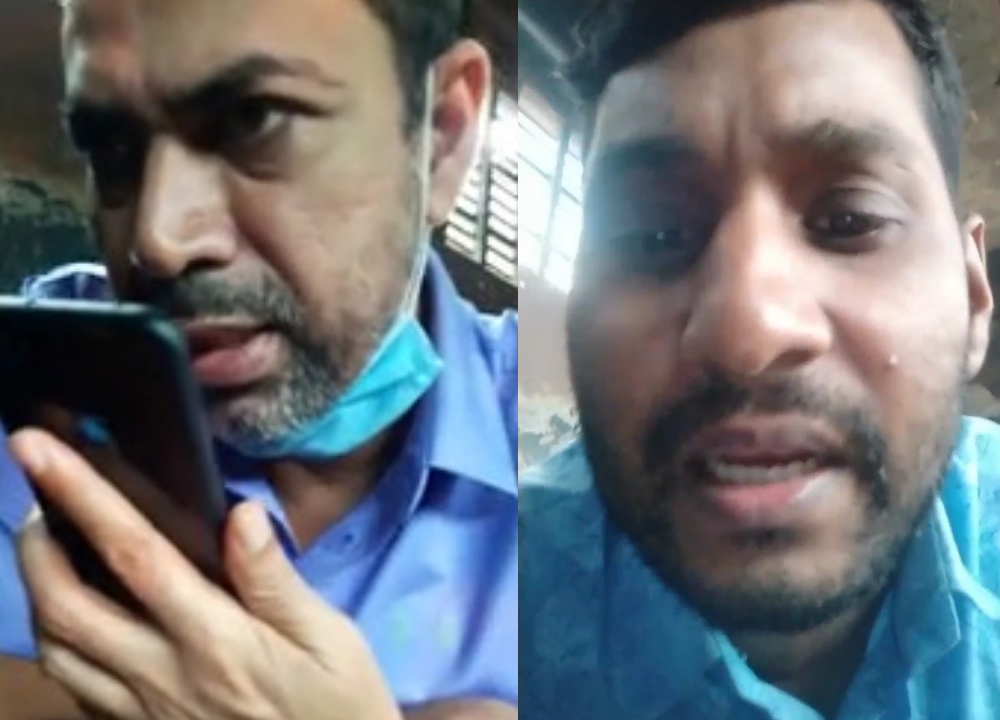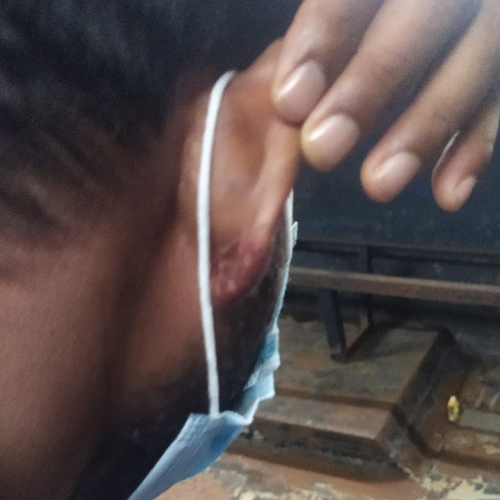Sinha Murder: Allegations of gruesome torture on detained police officers in RAB custody
“They gave us electric shocks. To the ears and other places. Ripped off chest hair. Gave us injections. We were hung by our hands from the ceiling. Beat mercilessly…”

Liakat Ali and Pradeep Kumar Das, the main suspects in the murder case of retired Bangladesh Army major, Sinha Mohammad Rashed Khan, have alleged in video messages directed at senior police officials that they were tortured whilst in the custody of Rapid Action Battalion (RAB). RAB was directed to investigate the death of Khan on July 31, 2020 by an order of Cox’s Bazar district court.
Liakat Ali was the chief inspector of Baharchara Police Investigation Centre under the Teknaf police station in Cox’s Bazar and was the police officer who shot Major Sinha, though he claims he did this in self-defence not with an intention to murder. Pradeep Kumar Das was the Officer in Charge of Teknaf Thana, and is claimed to have been involved in giving the order to kill. There are also allegations that another suspect in the case sub-inspector Nandadulal Rakkhit was also tortured whilst in RAB custody.
The videos containing the allegations were recorded by Liakat Ali and Pradeep Kumar Das while they were being transported from Cox’s Bazar court to the prison. In them, the two detainees state the allegations, meant to be communicated to high ranking police officials as complaints. Netra News received the clips from a police official with four other police officers independently verifying the clips. The police officials told Netra News that the police IGP Benazir Ahmed and other higher police officials were aware of the torture of their colleagues in RAB custody.
One police officer told a Netra News reporter that their colleagues were hung from the ceiling naked and beaten mercilessly. They were also given electric shocks to the genitals and ears and other sensitive parts of their bodies. One police official described the torture, “They gave electric shocks to the testicles of Pradeep and Liakat. We came to know that Pradeep, Liakat, and Nandadulal were stripped and kept together.”
What Liakat and Pradeep said in the videos
Police officials informed Netra News that the videos were recorded recently during the transport of the suspects from court to prison.
In one video Pradeep Kumar Das said, “They [RAB] were furious, and beat us with no restraints. They made sure there were no marks from the beatings and began to give us electric shocks in the presence of a doctor. We have the burn marks from the shocks to different places of our body, sir. They kept us in hand-cuffs and standing around the clock. We did not get water or food. This is such inhuman treatment, sir.” Pradeep showed the marks where he was administered the electric shocks. Netra News has also obtained photos of wounds on Liakat’s ears.

Pradeep Kumar Das in the video message to the high police officials requested them to handle the matter “strictly.” According to him, “These people [RAB officials] are saying charges are being pressed against you from different places. RAB will investigate all these cases. After RAB takes charge of the investigations you will be brought here again and we will deal with you very sternly. So, do exactly as we tell you to do.”
In the video, Pradeep identified RAB officers Major Mehedi, Major Yasin and Major Shahriar as his torturers. Major Mehedi Hasan of Bangladesh Army is the second in command of Bandarban and Cox’s Bazar district RAB-15. Netra News could not find out more information about Major Yasin and Major Shahriar.
The primary suspect of the Sinha murder case Liakat Ali said in his video message, “They hurt us very badly, sir. You probably gave our photos to the DG of RAB. DG RAB sir came here the other day. He said nothing will happen [to us]. But the ADG of RAB mainly ordered the torture. The ADG of RAB tortured us more, sir.”
By convention, the director general (DG) of RAB, the elite agency that combines military and non-military forces, is a senior police officer, with its current head being the Additional Director General of Police, Chowdhury Abdullah Al-Mamun. Earlier on 17 August, Al-Mamun visited the crime scene of Sinha murder at Shaplapur. The additional director general (ADG) post of RAB is typically given to army officials and currently this is Colonel Tofael Mostafa Sarowar.
Despite the assurance from the RAB DG that “nothing will happen” to the suspects, the ADG of RAB Colonel Tofael Mostafa Sarowar ordered their torture nevertheless, alleged Liakat, “Because of his [Colonel Tofael] orders, we were kept stripped naked whole night — why did we show photos to the RAB DG? Why did you take photos? — that is why they kept us without cloths the whole night. The next day they took us inside and gave electric shocks. To our ears and other places. Ripped up chest hair. Gave us injection. Hung us from the ceiling. Beat us mercilessly, sir.”
Colonel Tofael Mostafa Sarowar declined to comment on the subject when Netra News contacted him.
A police official informed Netra News that RAB is “desperately looking” for 5 other police personnel from Teknaf Thana, who are not connected to the Sinha murder. Moreover, Pradeep has claimed that RAB “tried very hard” to force out a confession that Cox’s Bazar Police Super ABM Masud Hossain is also involved in the murder.
RAB’s statement
When contacted for comments regarding the torture of Liakat Ali, Pradeep Kumar Das and Nandadulad Rakkhit, RAB spokesperson Lieutenant Colonel Ashique Billah told Netra News, “Not only as the spokesperson for RAB, I can also tell you from my longtime experience of working in crime that no such incident [torture] took place. Whatever was done, was done by following the legal procedures.” The RAB spokesperson said he would like to comment on the subject after looking more closely into the matter.
Custodial torture in Bangladesh
Even though it is the police officials who are being allegedly tortured by RAB, allegations of custodial torture are more prevalent against the police, which is the primary law enforcing agency. Most notably, the police and other agencies often resort to torture in custody to extract confessions under section 164 of the Code of Criminal Procedure, and many who do confess under this provision later complain that their statement was coerced. On August 30th, after these videos were filmed, Liakat Ali and Nandadulal gave confessional statements to the court under section 164. Liakat Ali confessed to shooting and Nandadulal confessed to aiding.
Recently, suspects in a case alleging gang rape and murder of a young woman in in Narayanganj gave confessional statements to the local police about their involvement in their crime. But the supposed victim later turned out alive and said that she had only eloped with her lover. This created a sensation in Bangladesh.
Since 1998, Bangladesh is a signatory of the Convention against Torture and Other Cruel, Inhuman or Degrading Treatment or Punishment treaty of the United Nations (CAT). Local and international human rights organisations have been accusing Bangladesh Police, RAB and other law enforcement agencies of regular and frequent brutal torture in custody of detainees — but the government has always denied the accusations. The Bangladesh government submitted its first report to the UN CAT committee in 2019, 20 years overdue. In the report, the government claimed that it takes all available legal actions against torture in custody.
In 2013, the Bangladesh parliament passed the Torture and Custodial Death (Prevention) Act, 2013 — but there have been very few prosecutions of police or other law enforcement agency members. Despite that, police officials in 2017 asked for Prime Minister Sheikh Hasina’s intervention in abolishing the act. Earlier, in 2015 the police had sent a letter to the home ministry seeking the repeal of different provisions in the law, including the provisions for prosecution for allegation of custodial torture.
Even though Pradeep Kumar Das is now raising the allegation of torture against him, he himself has admitted to carrying out extrajudicial killings and custodial torture on people suspected of drug dealing. Netra News recently published a video piece compiling his statements from different clips where he implicated himself.
In 2018, just before Bangladesh’s controversial national election, Prime Minister Sheikh Hasina declared a “war against drugs.” A few hundred suspected drug dealers were killed in the so-called “gun battles” in the next few months. According to figures by Bangladesh Peace Observatory of Dhaka University, over 200 suspects were killed by law enforcement agencies in this time in Teknaf alone — and amongst them, at least 150 were killed by the Teknaf Police whilst under the command of Pradeep Kumar Das. Teknaf is often mentioned as the primary route for smuggling Yaba tablets and other drugs from neighbouring Myanmar.
In 2003-4 the erstwhile BNP-led coalition government launched Operation Clean Heart by the army in order to curb crimes. About 24 people died in custody during the operation carried out by the joint force led by the army. Official statements designated most of these deaths as “heart attacks.” But families of the deceased people complained that they resulted from torture. The Awami League leader Saber Hossain Chowdhury MP — who initiated the bill for Torture and Custodial Death (Prevention) Act in parliament — also claimed that he was himself tortured whilst detained during this operation.
Other notable instances of custodial deaths also include the deaths of BDR (currently BGB) members who died in army custody following the 2009 BDR mutiny which had itself resulted in the killings of 57 army officials. The official reasons given for the custodial deaths were “heart attacks,” “sickness,” or “suicide”, but there are allegations that these detainees died from torture.
There are also allegations of torture on detainees by Bangladesh’s military intelligence agency DGFI.
The Rapid Action Battalion or RAB was formed in 2004 after Operation Clean Heart ended. There are many documented cases of extrajudicial killings, enforced disappearances, as well as custodial torture against RAB and Human Rights Watch as a result termed the organisation a “death squad.”
Despite the head of RAB being from the police, the battalions that carry out the operations are led by military personnel, mainly from the army. Experts say that inclusion of the military contributed to the organisation’s proclivity towards violence and created a psychological rift between the police and RAB. According to human rights organisations, RAB and the police are currently equally involved in extrajudicial killings and enforced disappearances.●
🔗 Netra News: DGFI: Retired Bangladesh army major killed by police in police “shooting competition” (2020)
🔗 Netra News: OC Prodip Kumar – Cop or Murderer? (2020)
🔗 Netra News: Bangladesh’ national police chief who denies extra judicial killing (2020)
🔗 Human Rights Watch: Bangladesh: Elite Force Tortures, Kills Detainees (2006)
🔗 Human Rights Watch: Torture, Custodial Deaths, and Unfair Trials after the 2009 Mutiny of the Bangladesh Rifles (2012)